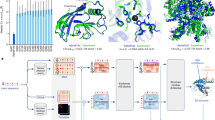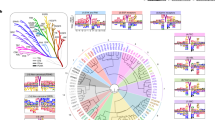Abstract
IN a recent paper, Kögl and Erxleben1 record some interesting observations which suggest that the proteins of malignant tissues are partially ‘racemized’. From several normal tissues they were able to isolate, after short acid hydrolysis, relatively good yields of the usual l(+) glutamic acid, showing, in 9 percent hydrochloric acid, the normal rotation of [α]D + 31.6°, whereas the products isolated from an ovarian tumour, an ovarian carcinoma and from two different mammary carcinomas showed rotations of [α]D + 21.8°, + 4.6°, + 11.6° and + 16.1°, suggesting that they contained 15.6, 42.7, 31.7 and 24.6 per cent respectively of d(—) glutamic acid. The importance of these findings needs no emphasis, and confirmation in other laboratories is clearly desirable.
This is a preview of subscription content, access via your institution
Access options
Subscribe to this journal
Receive 51 print issues and online access
$199.00 per year
only $3.90 per issue
Buy this article
- Purchase on Springer Link
- Instant access to full article PDF
Prices may be subject to local taxes which are calculated during checkout
Similar content being viewed by others
References
Kögl and Erxleben, Z. physiol. Chem., 258, 57, (1939).
Foreman, Biochem. J., 8, 463, (1914).
Sharp, Biochem. J., 33, 679, (1939).
Author information
Authors and Affiliations
Rights and permissions
About this article
Cite this article
CHIBNALL, A., REES, M., TRISTRAM, G. et al. The Glutamic Acid of Tumour Proteins. Nature 144, 71–72 (1939). https://doi.org/10.1038/144071a0
Issue Date:
DOI: https://doi.org/10.1038/144071a0
This article is cited by
-
Glutamic Acid of Proteins
Nature (1940)
-
Glutamic Acid of Proteins
Nature (1940)
-
Glutamic Acid of Proteins
Nature (1940)
-
Zur Biochemie der Tumoren
Zeitschrift für Krebsforschung (1940)
-
Zur Frage der optischen Aktivität der aus Tumoreiweiß isolierten Glutaminsäure
Zeitschrift für Krebsforschung (1940)
Comments
By submitting a comment you agree to abide by our Terms and Community Guidelines. If you find something abusive or that does not comply with our terms or guidelines please flag it as inappropriate.



